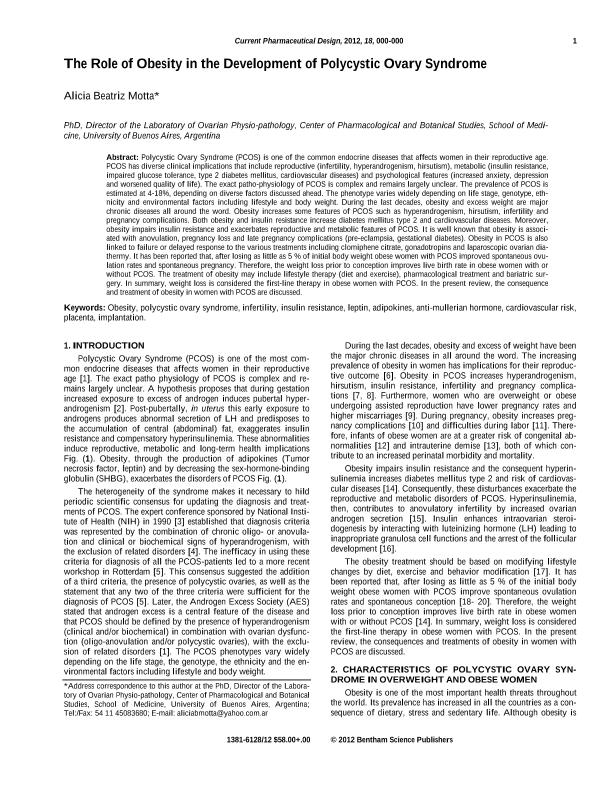Mostrar el registro sencillo del ítem
dc.contributor.author
Motta, Alicia Beatriz

dc.date.available
2017-05-31T21:41:13Z
dc.date.issued
2012-06
dc.identifier.citation
Motta, Alicia Beatriz; The role of obesity in the development of polycystic ovary syndrome; Bentham Science Publishers; Current Pharmaceutical Design.; 18; 17; 6-2012; 2482-2491
dc.identifier.issn
1381-6128
dc.identifier.uri
http://hdl.handle.net/11336/17235
dc.description.abstract
Polycystic Ovary Syndrome (PCOS) is one of the common endocrine diseases that affects women in their reproductive age. PCOS has diverse clinical implications that include reproductive (infertility, hyperandrogenism, hirsutism), metabolic (insulin resistance, impaired glucose tolerance, type 2 diabetes mellitus, cardiovascular diseases) and psychological features (increased anxiety, depression and worsened quality of life). The exact patho-physiology of PCOS is complex and remains largely unclear. The prevalence of PCOS is estimated at 4-18%, depending on diverse factors discussed ahead. The phenotype varies widely depending on life stage, genotype, ethnicity and environmental factors including lifestyle and body weight. During the last decades, obesity and excess weight are major chronic diseases all around the word. Obesity increases some features of PCOS such as hyperandrogenism, hirsutism, infertility and pregnancy complications. Both obesity and insulin resistance increase diabetes mellitus type 2 and cardiovascular diseases. Moreover, obesity impairs insulin resistance and exacerbates reproductive and metabolic features of PCOS. It is well known that obesity is associated with anovulation, pregnancy loss and late pregnancy complications (pre-eclampsia, gestational diabetes). Obesity in PCOS is also linked to failure or delayed response to the various treatments including clomiphene citrate, gonadotropins and laparoscopic ovarian diathermy. It has been reported that, after losing as little as 5 % of initial body weight obese women with PCOS improved spontaneous ovulation rates and spontaneous pregnancy. Therefore, the weight loss prior to conception improves live birth rate in obese women with or without PCOS. The treatment of obesity may include lifestyle therapy (diet and exercise), pharmacological treatment and bariatric surgery. In summary, weight loss is considered the first-line therapy in obese women with PCOS. In the present review, the consequence and treatment of obesity in women with PCOS are discussed.
dc.format
application/pdf
dc.language.iso
eng
dc.publisher
Bentham Science Publishers

dc.rights
info:eu-repo/semantics/openAccess
dc.rights.uri
https://creativecommons.org/licenses/by-nc-sa/2.5/ar/
dc.subject
Obesity
dc.subject
Adipokines
dc.subject
Anti Mullerian Hormone
dc.subject
Cardiovascular Risk
dc.subject
Implantation
dc.subject
Infertility
dc.subject
Insulin Resistance
dc.subject
Leptin
dc.subject
Placenta
dc.subject
Polycystic Ovary Syndrome
dc.subject.classification
Nutrición, Dietética

dc.subject.classification
Ciencias de la Salud

dc.subject.classification
CIENCIAS MÉDICAS Y DE LA SALUD

dc.title
The role of obesity in the development of polycystic ovary syndrome
dc.type
info:eu-repo/semantics/article
dc.type
info:ar-repo/semantics/artículo
dc.type
info:eu-repo/semantics/publishedVersion
dc.date.updated
2017-05-31T20:03:48Z
dc.journal.volume
18
dc.journal.number
17
dc.journal.pagination
2482-2491
dc.journal.pais
Emiratos Árabes Unidos

dc.journal.ciudad
Sharjah
dc.description.fil
Fil: Motta, Alicia Beatriz. Consejo Nacional de Investigaciones Científicas y Técnicas. Oficina de Coordinación Administrativa Houssay. Centro de Estudios Farmacológicos y Botánicos. Universidad de Buenos Aires. Facultad de Medicina. Centro de Estudios Farmacológicos y Botánicos; Argentina
dc.journal.title
Current Pharmaceutical Design.

dc.relation.alternativeid
info:eu-repo/semantics/altIdentifier/url/http://www.ingentaconnect.com/content/ben/cpd/2012/00000018/00000017/art00011?crawler=true
Archivos asociados
